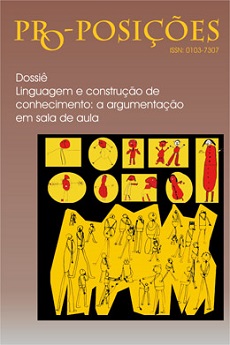Resumo
Este trabalho focaliza tipos de inferências utilizados nos processos de justificativa e de descoberta envolvidos na argumentação e na construção de conhecimentos. Sugere-se que uma estrutura dedutiva do tipo se p, então q é utilizada quando se apresentam e se justificam idéias. Para investigar esta hipótese, analisamos uma aula de História da 5ª. série do Ensino Fundamental sobre escravidão no Brasil, focalizando como um dos alunos mais participativos apresenta suas hipóteses para a existência da escravidão. Os resultados confirmam que uma estrutura inferencial dedutiva é utilizada para justificar opiniões. Observa-se, no entanto, que, no processo de geração de hipóteses ou de descoberta, inferências abdutivas são freqüentemente utilizadas. Estes resultados sugerem que, para que haja construção de conhecimento, faz-se necessário o acesso não apenas a informações que possibilitem a geração de hipóteses explicativas, mas também a oportunidades para que os alunos avaliem as bases nas quais se apóiam suas idéias.
Referências
BILLIG, Michael. Arguing and thinking: a rethorical approach to social psychology. Cambridge: Cambridge University Press, 1987, 325p.
CHENG, Patricia; HOLYOAK, Keith. Pragmatic reasoning. Cognitive Psychology 17, p.391- 416, 1985.
COPI, Irving. Introdução à lógica. 2a.ed. São Paulo: Editora Mestre Jou, 1978, 491p.
EVANS, Jonathan. Theories of reasoning: the fragmented state of the art. Theory & Psychology. Sage, 1(1), 83-105, 1991.
EVANS, Jonathan; BARSTON, Julie; POLLARD, Paul. On the conflict between logic and belief in syllogistic reasoning. Memory and cognition, 11(3), p.295-306, 1983.
FISHER, Hans Rudi. Abductive reasoning as a way of worldmaking. In: RIEGLER, A. (Ed.). Foundations of science, special issue on the impact of radical constructivism on science, v.6, n.4, p.361-383, 2001.
GALOTTI, Kathleen. Approaches to studying formal and everyday reasoning. Psychological bulletin, 105(3): p.331-351, 1989.
GARNHAM, Alan; OAKHILL, Jane. Thinking and reasoning. Oxford: Blackwell, 1994, 265p.
GERRITSEN, Susanne. A defense of deductivism in reconstructing unexpressed premises. In: EEMEREN, Frans van; GROOTENDORST, Rob (Eds.). Studies in pragma-dialectics. Amsterdam: Sic Sat, 41-47, 1994.
GROARKE, Leo. What pragma-dialectics can learn from deductivism, and what deductivism can learn from pragma-dialectics. In: EEMEREN, Frans van; GROOTENDORST, Rob; BLAIR, Johnson; WILLARD, Charles (Eds.) Analysis and evaluation. Proceedings of the third ISSA conference on argumentation, v.2, p.138-145. University of Amsterdam, The Netherlands, 1994.
GROOTENDORST, Rob. Everyday argumentation from a speech act perspective. Communication & cognition, special issue: Argumentation, 24(1), p.111-134, 1991.
JACKSON, Sally; JACOBS, Scott. Structure of conversational argument: pragmatic bases for the enthymeme. Quartely journal of speech, 66, p.251-265, 1980.
JOHNSON, Ralph; BLAIR, Johnson. Context of informal reasoning: commentary. In: VOSS, James; PERKINS, David; SEGAL, Judith (Eds.). Informal reasoning and education. Hillsdale, NJ: Lawrence Erlbaum Associates, p.131-150, 1991.
JOHNSON-LAIRD, Phil. Mental models. Cambridge: Cambridge University Press, 1983.
JOHNSON-LAIRD, Phil; ANDERSON, Tony. Common-sense inference. Unpublished Manuscript, 1988.
KUHN, Deanna. The skills of argument. Cambridge: Cambridge University Press, 1991, 324p.
LEITÃO, Selma. The potential of argument in knowledge building. Human development, 43, p.332-360, 2000.
NICKERSON, Raymond. Modes and models of informal reasoning: a commentary. In: VOSS, James; PERKINS, David; SEGAL, Judith (Eds.). Informal reasoning and education. Hillsdale, NJ: Lawrence Erlbaum Associates, p.291-309, 1991.
NOVECK, Ira; LEA, R. Brooke; DAVIDSON, George; OBRIEN, David. Human reasoning is both logical and pragmatic. Intellectica, 1991/1, 11, p.81-109, 1991.
PEIRCE, Charles. Déduction, induction et hypothèse. In: PEIRCE, Charles. A la recherche d une méthode, part III Le pragmatisme et la méthode expérimentale. Presses Universitaires de Perpignan (Collection Etudes), p.177-194, 1878/1993.
RIPS, Lance. Reasoning. Annual review of Psychology, 41, p.321-353.
SANTOS, Clara. Fazendo de conta, tudo pode. Uma investigação sobre o raciocínio lógicodedutivo em silogismos com conteúdos referentes às crenças dos sujeitos. 1989. 143p. Dissertação (Mestrado em Psicologia). Universidade Federal de Pernambuco, Recife, Brasil, 1989.
SANTOS, Clara. Good reasoning: to whom? when? how?: An investigation of belief effects on syllogistic and argumentative reasoning. 1996. 358p. Tese (Doutorado em Psicologia). University of Sussex, UK.
SANTOS, Clara. O que penso? quando? como?: O efeito das interpretações pragmáticas na produção de textos argumentativos. Temas em psicologia, 7, (1), p.37-38, 1999.
SANTOS, Clara; SANTOS, Selma. Good argument, content and contextual dimensions. In: RIJLAARSDAM Gert; ESPÉRET, Eric (Series Eds.); COIRIER, Pierre; ANDRIESSEN, Jerry (Eds.) Studies in writing: Vol.5, Foundations of argumentative text processing. Amsterdam, Amsterdam University Press, p.87-95, 1999.
SANTOS, Selma. A construção de argumento no quotidiano. In: DIAS, Maria; SPINILLO, Alina (Orgs.). Tópicos em psicologia cognitiva. Recife: Ed. Universitária UFPE, p.45-81, 1996.
VOSS, James; PERKINS, David; SEGAL, Judith (Eds.), Informal reasoning and education. Hillsdale, NJ: Lawrence Erlbaum associates, 1991, 495p.

Este trabalho está licenciado sob uma licença Creative Commons Attribution 4.0 International License.
Copyright (c) 2016 Pro-Posições

